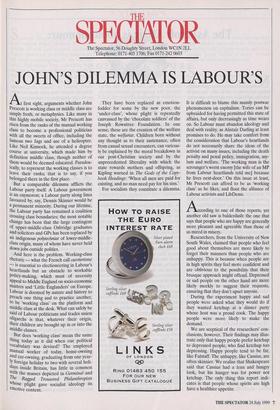SPECT THE AT OR The Spectator, 56 Doughty Street, London WC1N 2LL
Telephone: 0171-405 1706; Fax 0171-242 0603
JOHN'S DILEMMA IS LABOUR'S
t first sight, arguments whether John Prescott is working class or middle class are simply froth, or metaphysics. Like many in this highly mobile society, Mr Prescott has risen from the ranks of the manual working class to become a professional politician with all the sweets of office, including the famous two Jags and use of a helicopter. Like Neil Kinnock, he attended a degree course at university, which made him by definition middle class, though neither of them would be deemed educated. Paradox- ically, to represent the working classes is to leave their ranks; that is to say, if you belonged there in the first place.
But a comparable dilemma afflicts the Labour party itself. A Labour government is an oxymoron; a Labour party along lines favoured by, say, Dennis Skinner would be a permanent minority. During our lifetime, the Labour party has remained a coalition crossing class boundaries; the most notable change has been that the large contingent of upper-middle-class Oxbridge graduates and solicitors and GPs has been replaced by an indigenous polytechniat of lower-middle- class origin, many of whom have never held down jobs outside politics, And here is the problem. Working-class rhetoric — what the French call ouvtierisme — is essential to electioneering in Labour's heartlands but an obstacle to workable Policy-making, which must of necessity appeal to Middle England on socio-economic 'natters and 'Little Englanders' on Europe. Labour is doomed by nature and history to preach one thing and to practice another, to be 'working class' on the platform and middle class at the desk. What can safely be said of Labour politicians and trades union oligarchs is that, whatever their origin, their children are brought up in or into the middle classes.
But does `working class' mean the same thing today as it did when our political vocabulary was devised? The employed manual worker of today, home-owning and car-owning, graduating from one year- ly foreign holiday to two with several holi- days inside Britain, has little in common with the masses depicted in Germinal and The Ragged Trousered Philanthropists whose plight gave socialist ideology its emotive content. They have been replaced as emotion- fodder for some by the new poor, the `under-class', whose plight is repeatedly canvassed by the 'chocolate soldiers' of the Joseph Rowntree Foundation. In one sense, these are the creation of the welfare state, the welfariat. Children born without any thought as to their sustenance, often from casual sexual encounters, can various- ly be explained by the moral breakdown in our post-Christian society and by the unprecedented liberality with which the state rewards mothers and offspring, as Kipling warned in The Gods of the Copy- book Headings: 'When all men are paid for existing, and no man need pay for his sins.'
For socialists they constitute a dilemma. It is difficult to blame this mainly postwar phenomenon on capitalism. Tories can be upbraided for having permitted this state of affairs, but only decreasingly as time wears on. So Labour must abandon ideology and deal with reality, as Alistair Darling at least promises to do. He may take comfort from the consideration that Labour's heartlands do not necessarily share the ideas of the activist on many issues, including the death penalty and penal policy, immigration, asy- lum and welfare. 'The working man is the scrounger's worst enemy [the wife of an MP from Labour heartlands told me] because he lives next-door.' On this issue at least, Mr Prescott can afford to be as 'working class' as he likes, and flout the alliance of Labour activists and LibDems.
According to one of those reports, yet another old saw is balderdash: the one that says that people who are happy are generally more pleasant and agreeable than those of us mired in misery.
Researchers, from the University of New South Wales, claimed -that people who feel good about themselves are more likely to forget their manners than people who are unhappy. This is because when people are in high spirits they feel mote confident and are oblivious to the possibility that their brusque approach might offend. Depressed or sad people on the other hand are more likely meekly to suggest their requests, ensuring that they don't upset anyone.
During the experiment happy and sad people were asked what they would do if they wanted ketchup at a dinner party whose host was a proud cook. The happy people were more likely to make the demand.
We are sceptical of the researchers' con- clusions, however. Their findings may illus- trate only that happy people prefer ketchup to depressed people, who find ketchup too depressing. Happy people tend to be fat, like Falstaff. The unhappy, like Cassius, are often skinnier. We realise that Shakespeare said that Cassius had a lean and hungry look, but his hunger was for power not ketchup. The only thing this report indi- cates is that people whose spirits are high have a healthier appetite.


























































 Previous page
Previous page